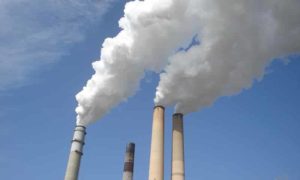UPDATE: The EPA has planned only ONE public hearing on their proposed Affordable Clean Energy Rule (aka Dirty Power Plan) that will replace the Clean Power Plan. The public hearing is scheduled for October 1, 9am-8pm in Chicago. The deadline to preregister to speak at the hearing is September 24th.
The Sierra Club is sending a bus to Chicago that will make stops in St. Louis, Alton, and Springfield. Find out more about the bus schedule here or sign up to take the bus here.
The Trump Administration Environmental Protection Agency (EPA) has announced the Affordable Clean Energy (ACE) rule as a replacement for the 2015 Obama era Clean Power Plan (CPP). The resulting change will mean an increase in harmful pollution emitted in the atmosphere and increase the risk of respiratory illness in vulnerable populations. According to the Washington Post, the rules change “would allow coal-fired plants to run longer if they became more efficient, which could increase the total amount of soot and smog-forming pollutants they emit.”
 “These changes to the CPP will make Illinois coal plant communities dirtier,” says Prairie Rivers Network Executive Director Carol Hays. “They will allow these aging coal plants to run longer, polluting more of our air and water.”
“These changes to the CPP will make Illinois coal plant communities dirtier,” says Prairie Rivers Network Executive Director Carol Hays. “They will allow these aging coal plants to run longer, polluting more of our air and water.”
Illinois’ Attorney General Lisa Madigan released a statement about the Trump administration’s proposed plan stating, “The U.S. EPA’s complete rejection of the Clean Power Plan and our country’s path to a cleaner and safer environment will have disastrous consequences. I will take legal action to ensure the federal government does its job to protect our environment and our health.”
Madigan is part of an existing coalition including more than two dozen other states and cities that defended the Clean Power Plan. The Clean Power Plan sought to control the amount of climate change pollution that power plants can emit and would have eliminated as much pollution as 70% of the nation’s passenger cars.
The EPA’s own analysis of the newly proposed ACE rule found that the plan could lead to as many as 1,400 premature deaths annually by 2030 from an increase in extremely fine particulate matter.
By making these rules changes, the EPA continues to lag behind on addressing climate change, human health impacts, and the legacy of the country’s past energy use. In June of 2017, the United States pulled out of the Paris Climate Accord, and earlier this year, the EPA signed new rules to weaken toxic coal ash pollution safeguards.
“We cannot wait any longer to address climate change,” Hays said. “Real action is needed to slash carbon pollution and drive the U.S. to a carbon-free economy. Wildlife and human well-being hang in the balance.”







